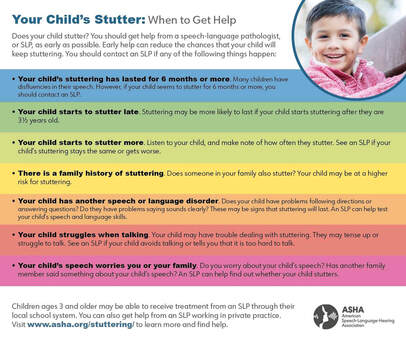
https://www.asha.org/stuttering/
This week is National Stuttering Awareness Week! Did you know that stuttering usually starts between 2 and 6 years of age? Many children go through normal periods of disfluency lasting less than 6 months. Stuttering that lasts longer may need treatment.
Talking to people can be hard if you stutter. You may get stuck on certain words or sounds. You may feel tense or uncomfortable. You might change words to avoid stuttering. Speech-language pathologists, or SLPs, can help.
About Stuttering
People who stutter may have more disfluencies and different types of disfluencies. They may repeat parts of words (repetitions), stretch a sound out for a long time (prolongations), or have a hard time getting a word out (blocks).
Stuttering is more than just disfluencies. Stuttering also may include tension and negative feelings about talking. It may get in the way of how you talk to others. You may want to hide your stuttering. So, you may avoid certain words or situations. For example, you may not want to talk on the phone if that makes you stutter more.
Stuttering can change from day to day. You may have times when you are fluent and times when you stutter more. Stress or excitement can lead to more stuttering.
Signs and Symptoms of Stuttering
- Adding a sound or word, called an interjection – "I um need to go home."
- Repeating whole words – "Well well, I don’t agree with you."
- Repeating phrases – "He is–he is 4 years old."
- Changing the words in a sentence, called revision – "I had–I lost my tooth."
- Not finishing a thought – "His name is . . . I can't remember."
The following types of disfluencies happen when someone stutters:
- Part-word repetitions – "I w-w-w-want a drink."
- One-syllable word repetitions – "Go-go-go away."
- Prolonged sounds – "Ssssssssam is nice."
- Blocks or stops – "I want a (pause) cookie."
Feelings and attitudes can affect stuttering. For example, frustration or tension can cause more disfluencies. Being excited or feeling rushed can also increase disfluencies. A person who stutters may also stutter more if others tease them or bring attention to their speech. Stuttering may cause a person to be embarrassed and make them feel nervous about talking.
Causes of Stuttering
There is no one cause of stuttering. Possible causes include the following:
- Family history. Many people who stutter have a family member who also stutters.
- Brain differences. People who stutter may have small differences in the way their brain works during speech.
- Gender. Boys are more likely to continue stuttering than girls. Data are currently limited to individuals who identify as male or female.
- Age when stuttering began. Children who start stuttering at age 3½ or later are more likely to continue stuttering.
- Family recovery patterns. Children with family members who continued to stutter are also more likely to continue.
Seeing a Professional
- Your child's stuttering has lasted for 6–12 months or more.
- Your child starts to stutter late (after 3½ years old).
- Your child starts to stutter more often.
- Your child tenses up or struggles when talking.
- Your child avoids talking or says it is too hard to talk.
- There is a family history of stuttering.
Testing for Stuttering
- The types of disfluencies (typical and stutter-like).
- The number of disfluencies that are the stuttering type.
- How your child reacts when they stutter – do they get upset?
- How your child tries to "fix" their speech – do they start over or stop talking?
The SLP will also test your child's speech and language. This includes how your child says sounds and words, how well they understand what others say, and how well they use words to talk about their thoughts.
Treatment for Stuttering
- How much your child stutters
- How your child reacts when stuttering
- How stuttering impacts your child's everyday life
- How others react to your child when they stutter
- Your child's age
For preschool children, treatment may include the use of direct or indirect strategies.
- Direct strategies help your child change how they speak.
- Indirect strategies are ways to help make it easier for your child to talk. These strategies can include slowing down your own speech and asking fewer questions.
Treatment For Older Children and Adults Who Stutter
For older children and adults, treatment focuses on managing stuttering. An SLP will help them feel less tense and speak more freely in school, at work, and in different social settings. The SLP will also help the person face speaking situations that make them fearful or anxious. This might include speaking on the phone or ordering food at a restaurant.
Some adults who started stuttering as a child may want to see an SLP every once in a while. The SLP will talk to the person about how stuttering affects their everyday life and can help the person practice ways to manage stuttering.
Children and adults who stutter may want to look into local support groups, where they can talk with others who stutter and learn about other helpful resources.



 RSS Feed
RSS Feed
